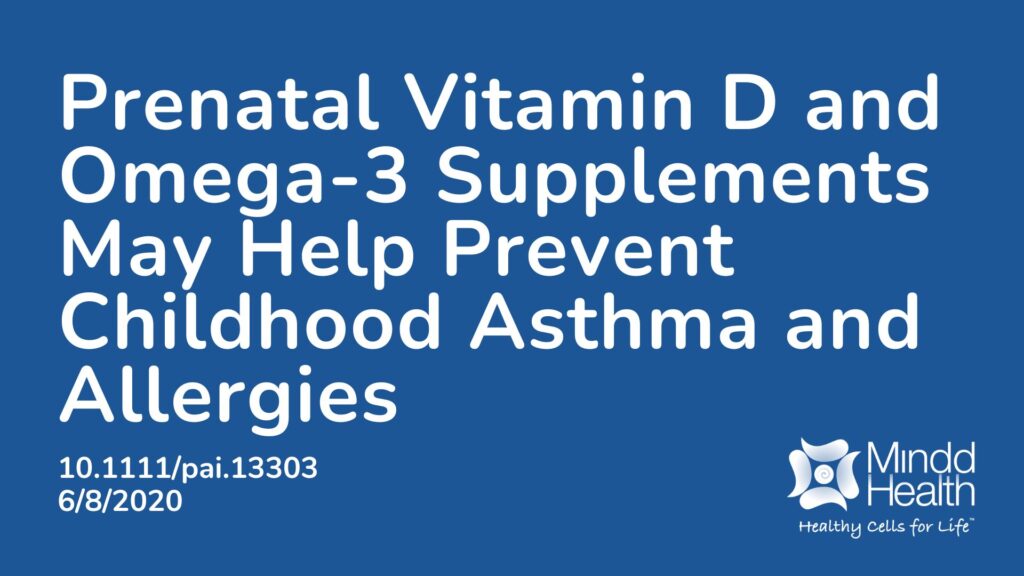Summary:
Allergic diseases such as asthma, allergic rhinitis, eczema, and food allergies can negatively impact quality of life, affecting academic performance and income, and in some cases, can be life-threatening. Maternal diet during pregnancy is a modifiable factor that could play a role in preventing these conditions. Research has shown that omega-3 fatty acid supplements during pregnancy and breastfeeding may lower the risk of allergic sensitization to eggs and peanuts. Additionally, probiotic supplements given after birth have been shown to reduce the risk of eczema and allergic sensitization to cow’s milk. However, there are limited randomized controlled trials assessing this. This review aimed to summarize studies on how maternal diet during pregnancy affects childhood allergies. The study also compared the foods, nutrients, and dietary patterns identified as having allergy-preventive effects with current U.S. dietary guidelines. The review included 95 studies: 17 randomized controlled trials and 78 observational studies. The analysis revealed that vitamin D supplementation during pregnancy was associated with a reduced risk of wheezing or asthma in children, and omega-3 fatty acids reduced the risk of asthma/wheezing and allergic rhinitis. This suggests that prenatal vitamin D and omega-3 fatty acid supplementation may help prevent asthma and allergies in children.
Abstract:
Rationale: Allergic diseases are an increasing public health concern, and early life environment is critical to immune development. Maternal diet during pregnancy has been linked to offspring allergy risk. In turn, maternal diet is a potentially modifiable factor, which could be targeted as an allergy prevention strategy. In this systematic review, we focused on non-allergen-specific modifying factors of the maternal diet in pregnancy on allergy outcomes in their offspring. Methods: We undertook a systematic review of studies investigating the association between maternal diet during pregnancy and allergic outcomes (asthma/wheeze, hay fever/allergic rhinitis/seasonal allergies, eczema/atopic dermatitis (AD), food allergies, and allergic sensitization) in offspring. Studies evaluating the effect of food allergen intake were excluded. We searched three bibliographic databases (MEDLINE, EMBASE, and Web of Science) through February 26, 2019. Evidence was critically appraised using modified versions of the Cochrane Collaboration Risk of Bias tool for intervention trials and the National Institute for Clinical Excellence methodological checklist for cohort and case-control studies and meta-analysis performed from RCTs. Results: We identified 95 papers: 17 RCTs and 78 observational (case-control, cross-sectional, and cohort) studies. Observational studies varied in design and dietary intakes and often had contradictory findings. Based on our meta-analysis, RCTs showed that vitamin D supplementation (OR: 0.72; 95% CI: 0.56–0.92) is associated with a reduced risk of wheeze/asthma. A positive trend for omega-3 fatty acids was observed for asthma/wheeze, but this did not reach statistical significance (OR: 0.70; 95% CI: 0.45–1.08). Omega-3 supplementation was also associated with a non-significant decreased risk of allergic rhinitis (OR: 0.76; 95% CI: 0.56–1.04). Neither vitamin D nor omega-3 fatty acids were associated with an altered risk of AD or food allergy. Conclusions: Prenatal supplementation with vitamin D may have beneficial effects for prevention of asthma. Additional nutritional factors seem to be required for modulating the risk of skin and gastrointestinal outcomes. We found no consistent evidence regarding other dietary factors, perhaps due to differences in study design and host features that were not considered. While confirmatory studies are required, there is also a need for performing RCTs beyond single nutrients/foods.
Article Publication Date: 6/8/2020
DOI: 10.1111/pai.13303



